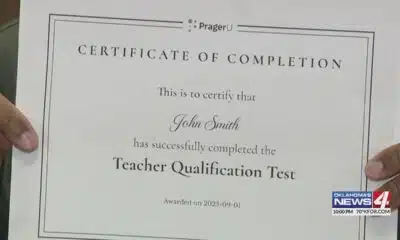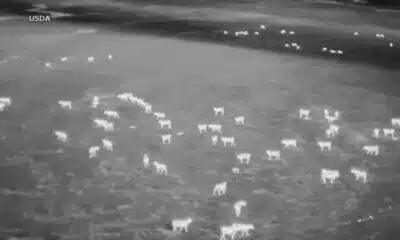News from the South - Florida News Feed
Lt. Gov. Nuñez to head FIU, leave DeSantis administration • Florida Phoenix
Lt. Gov. Nuñez to head FIU, leave DeSantis administration
by Jay Waagmeester, Florida Phoenix
February 7, 2025
Florida International University trustees voted Friday to install Lt. Gov. Jeanette Nuñez as interim president, meaning she will leave her statewide-elected office 23 months before her term expires. Trustees expect she will assume the presidency officially after a formal search.
“The governor’s office has contacted me and suggested that we consider Lt. Gov. Jeanette Nuñez as the next leader for FIU,” Board of Trustees Chair Roger Tovar said during a special meeting held via Zoom. “Subsequent to that, I have had several conversations with the Lt. Gov. Nuñez, who confirmed her interest in leading this great university, which happens to be her alma mater.”
During a news conference on immigration Friday morning, DeSantis said the leap actually was her idea. He applauded Nuñez for her support for his policies as lieutenant governor, including efforts to “bring some sanity” to higher education.
“This is something she was interested in doing, she had my endorsement and my support, and I think that she’s somebody that is very well regarded in the community anyways,” DeSantis said.
The interim hiring would be effective Feb. 17. The university must launch a formal search to name a president, although trustee Dean Colson said the “probable results of the search are already known.”
Sitting FIU President Kenneth Jessell, who served for three years and whose contract was set to expire in November, will become senior vice president and chief administrative officer. Tovar called the administrative changes “additive.”
“I have complete confidence in the lieutenant governor,” Jessell said. “She’s a double Panther, and I look forward to supporting her. I look forward to continuing supporting our students, our faculty, our staff, our alumni, our great supporters and donors, and our community.”
Finding funding
Trustees praised Jessell’s leadership while emphasizing a desire to boost fundraising efforts.
“Given the university FIU is today, a top 50 public preeminent research university, we need to increase our endowment to at least $500 million and triple our annual fundraising. World class universities have healthy endowments. This is imperative for the university’s future,” Tovar said.
The move, notably, comes shortly before the 2025 legislative session starts, when lawmakers will decide how much state support the Miami institution will receive.
Tovar said Nuñez’s experience as a health care lobbyist and lieutenant governor make her “an ideal leader to help transition FIU into the future,” noting her connections in the community and in Tallahassee.
She graduated from FIU in 1994 with a bachelor degree in political science and international relations and in 1998 earned a master degree in public administration.
Nuñez posted to X following the vote, saying she is “deeply committed to the success of FIU. I look forward to working with the Board of Trustees in the coming days.”
Her salary as lieutenant governor is $135,000. The outgoing president, Jessell, made a base salary of $650,000.
GET THE MORNING HEADLINES.
Opposition
Trustee Noël Barengo, representative of the FIU Faculty Senate, was the lone no-vote on Nuñez. He questioned the need to remove Jessell before the contract ended and voiced “deep concern about what we see as another effort by the governor’s office to interfere with public higher education.”
Several of the about 15 people speaking during public comment questioned Nuñez’s qualifications to serve in higher education, as well as the need for a new president given the lack of criticism of Jessell’s leadership.
“Jeanette Nuñez is a textbook example of what happens when politicians prioritize partisan loyalty over genuine leadership. Rather than standing up for people, for the people of Florida, Nuñez has acted as a rubber stamp for policies that erase history, limit opportunities, and push a narrow, exclusionary agenda,” said Kassandra Toussaint, mentioning Nuñez’s recent walk-back of her previous support for in-state tuition for Dreamers.
Every public-comment speaker was against the change in leadership.
“FIU deserves better than a yes-woman for DeSantis’ dangerous agenda,” Toussaint said. “We deserve leaders who fight for all of us, not just those who fit their narrow vision of who belongs.”
DeSantis specifically mentioned the Adam Smith Center for Economic Freedom at FIU, a think tank studying free-market policies labeled as non-partisan. He suggested the center might increase its activity under Nuñez.
“I think you have pretty much every right-of-center former head of state in the entire Western hemisphere has been there to talk, and so they’ve really been great at promoting free enterprise and the rule of law and constitutional government. I think they’re going to be able to do a lot more of that going forward,” the governor said.
Florida Democratic Party Chair Nikki Fried called the hiring “Republican hypocrisy.”
“Just a few weeks after she backflipped on protecting in-state tuition for Dreamers — Jeanette Nuñez will now lead one of the most diverse colleges in the state. With her record, how can she be trusted to lead the college with the largest population of Hispanic students in the country?” Fried said in a prepared statement Friday morning.
“Her appointment is just the latest move in Ron’s hostile takeover of Florida’s colleges and universities, as he continues to install political hacks and loyalists to push his partisan agenda,” Fried continued. “It has nothing to do with improving Florida’s cratering educational outcomes and everything to do with rewarding loyalty.”
‘Engaged governor’s office’
Naming of an interim president often follows the retirement or resignation of a sitting president. The transition at FIU defies common practice, Colson acknowledged.
“Is the current way we are selecting a president a perfect system? I don’t think so. Is the current selection process what was anticipated when the Florida Constitution was amended to create an independent board of governors? Again, I don’t think so,” Colson said.
“But will FIU find itself not just surviving but thriving over the next decade under its new leadership team? Well, I think so, and for that reason, I’m hopeful in support of your motion.”
Colson advocated for the Board of Governors to revise its presidential selection rules.
“We all know that the BOG is an independent constitutional body, but its rules did not anticipate the reality of an engaged governor’s office being involved in the hiring of our presidents. I don’t think this engagement is going to change in the next two years. And I think you can’t help but wonder what happens in two years when we have a new governor — are these presidencies going to be included in the jobs that a new governor might want to fill during his or her transition or first few years in office?”
Presidential searches often take months, requiring appointment of a formal search committee that names a shortlist of finalists (in the case of University of Florida and Ben Sasse the list was as short as one) that must be approved by the Board of Governors and university trustees.
The transition from interim to permanent president would cost “a lot of time and money,” “when the probable results of the search are already known,” Colson said.
YOU MAKE OUR WORK POSSIBLE.
Florida Phoenix is part of States Newsroom, a nonprofit news network supported by grants and a coalition of donors as a 501c(3) public charity. Florida Phoenix maintains editorial independence. Contact Editor Michael Moline for questions: info@floridaphoenix.com.
News from the South - Florida News Feed
Rudy Giuliani leaves the hospital after being injured in a car crash in New Hampshire
SUMMARY: Rudy Giuliani, 81, was released from the hospital after a car accident in New Hampshire where the vehicle he was in was struck from behind on Interstate 93. Giuliani sustained a fractured thoracic vertebra, multiple lacerations, contusions, and injuries to his left arm and leg. He and the driver, spokesman Ted Goodman, were helping a woman who reported a domestic violence incident when the crash occurred. Both suffered non-life-threatening injuries. The crash’s cause is under investigation, with no charges filed. Giuliani, known as “America’s mayor” for his 9/11 leadership, later served as Trump’s personal attorney, involved in controversial election fraud claims.
The post Rudy Giuliani leaves the hospital after being injured in a car crash in New Hampshire appeared first on www.news4jax.com
News from the South - Florida News Feed
Polls to open in Florida Senate, House special elections. How to find out if you should be voting
SUMMARY: Election Day in west Orange County, Florida, on Tuesday features special elections to fill two Florida Legislature vacancies in Senate District 15 and House District 40. Senate District 15 includes northwest Orange County areas like Winter Garden and College Park. The seat was vacated by the late Sen. Geraldine Thompson. Democratic State Rep. Bracy Davis faces Republican Willie J. Montague for the Senate seat. In House District 40, RaShon Young, Davis’ former chief of staff, won the Democratic primary and will compete against Republican Tuan Le and write-in Chris Hall in the Sept. 2 general election. Polls open 7 a.m.–7 p.m.; vote-by-mail ballots are due by 7 p.m.
The post Polls to open in Florida Senate, House special elections. How to find out if you should be voting appeared first on www.clickorlando.com
News from the South - Florida News Feed
Here’s what we know about COVID shots in Florida
SUMMARY: In Florida, confusion grows over COVID-19 vaccine access. Jen, a Tampa resident with an underlying condition, struggles to find vaccination sites despite consistent annual shots. Pharmacies like CVS now require prescriptions for vaccines in 16 states, including Florida, while Walgreens limits availability. The FDA approved the 2025/26 vaccine mainly for those 65+, requiring high-risk younger individuals to have prescriptions. Florida Surgeon General Dr. Joseph Ladapo opposes the vaccine, calling it unsafe. This hesitancy contrasts federal messages supporting choice, as CDC advisory meetings may soon clarify guidelines amid politicized debates. Many Floridians remain uncertain about vaccine availability and eligibility.
The post Here’s what we know about COVID shots in Florida appeared first on www.tampabay28.com
-
Mississippi Today2 days ago
DEI, campus culture wars spark early battle between likely GOP rivals for governor in Mississippi
-
Mississippi Today6 days ago
Judge: Felony disenfranchisement a factor in ruling on Mississippi Supreme Court districts
-
News from the South - North Carolina News Feed5 days ago
Parasocial party: Why people are excited for the Taylor Swift, Travis Kelce engagement
-
News from the South - Louisiana News Feed5 days ago
K+20: Katrina alters local health care landscape, though underlying ills still the same
-
Our Mississippi Home7 days ago
Katrina Remembered: A Hattiesburg Perspective
-
Mississippi News Video7 days ago
Today’s First Alert Weather Kid is Karson (8/26)
-
Local News7 days ago
Parents of missing 7-month-old California boy are charged with murder
-
Our Mississippi Home6 days ago
The Great Backyard Recovery – Helping Birds After the Storm








































